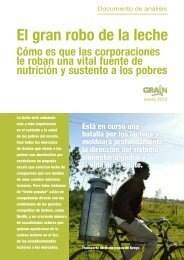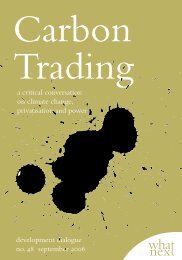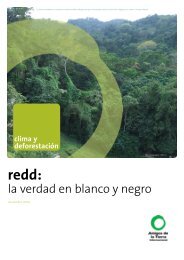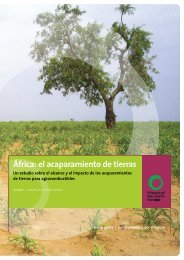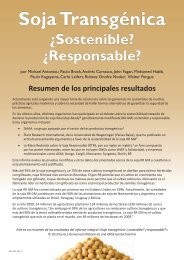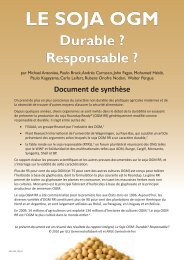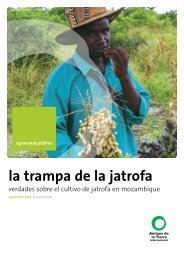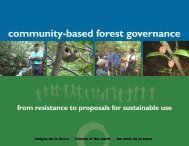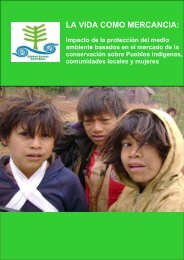Plantations, poverty and power - Critical Information Collective
Plantations, poverty and power - Critical Information Collective
Plantations, poverty and power - Critical Information Collective
Create successful ePaper yourself
Turn your PDF publications into a flip-book with our unique Google optimized e-Paper software.
8<br />
reduction in pay <strong>and</strong> benefits <strong>and</strong> half lost out on pensions. 3<br />
In South Africa, Mondi provides only 0.7 jobs for each 100 hectares of l<strong>and</strong> that it owns. But this<br />
employment total includes jobs in Mondi’s offices <strong>and</strong> mills. In the rural areas, the employment situation<br />
is even worse. 4 Figures from the Agricultural Census in Uruguay indicate that plantations generate fewer<br />
jobs even than extensive cattle-ranching. These few plantation jobs are often very badly paid. World<br />
Rainforest Movement has documented the “near-slavery” conditions for workers in plantations in<br />
Uruguay. 5<br />
Leonel does not mention that jobs in plantations are extremely dangerous. “The worst safety <strong>and</strong> health<br />
situation is usually found in forestry,” states ILO’s 2001 report. “Forestry work is also beset by serious<br />
health problems. Few workers reach normal retirement age. The safety <strong>and</strong> health situation is most<br />
problematic among contractors.” 6<br />
In South Africa, wages of manual workers employed by contractors are between US$50-75 a month<br />
compared to US$75-100 or more for those employed by companies. Company workers are entitled to<br />
pensions <strong>and</strong> medical benefits. Outsourced workers receive neither. 7<br />
<strong>Plantations</strong> are often established several years before the associated pulp mill starts up, which means that<br />
rural people are forced to move away from the area to look for work. When the pulp mill starts up the few<br />
jobs go mainly to people from outside the local area.<br />
Leonel’s list of the supposed environmental benefits of plantations is typical of the lies used by plantation<br />
proponents to justify their destructive industry. 8 <strong>Plantations</strong> do not restore degraded l<strong>and</strong>. Instead<br />
plantation companies seek the best l<strong>and</strong> with rich soils where their trees will grow fastest. The plantation<br />
industry (<strong>and</strong> its hired consultants) may well describe the l<strong>and</strong> that they want to take over as “degraded”<br />
or “not fit for traditional agriculture”, but to local people the l<strong>and</strong> is the basis of their livelihoods.<br />
<strong>Plantations</strong> do not conserve soil. They suck out nutrients <strong>and</strong> water. Research in Argentina has shown that<br />
they can increase salinisation by bringing salts to the surface of the soil. 9 That monoculture eucalyptus<br />
3 Poschen, Peter <strong>and</strong> Mattias Lövgren (2001) “Globalization <strong>and</strong> sustainability: The forestry <strong>and</strong> wood industries on the<br />
move”, International Labour Organisation, Geneva, page 64.<br />
http://www.ilo.org/public/libdoc/ilo/2001/101B09_179_engl.pdf<br />
4 “The sad figures of employment generated by plantation companies”, World Rainforest Movement Bulletin no. 50,<br />
September 2001. http://www.wrm.org.uy/bulletin/50/employ.html<br />
5 “Uruguay: Semi-slave work in plantation forestry”, World Rainforest Movement Bulletin no. 74, September 2003.<br />
http://www.wrm.org.uy/bulletin/74/SA.html#Uruguay<br />
6 Poschen, Peter <strong>and</strong> Mattias Lövgren (2001) “Globalization <strong>and</strong> sustainability: The forestry <strong>and</strong> wood industries on the<br />
move”, International Labour Organisation, Geneva, page 63.<br />
http://www.ilo.org/public/libdoc/ilo/2001/101B09_179_engl.pdf<br />
7 Poschen, Peter <strong>and</strong> Mattias Lövgren (2001) “Globalization <strong>and</strong> sustainability: The forestry <strong>and</strong> wood industries on the<br />
move”, International Labour Organisation, Geneva, page 65.<br />
http://www.ilo.org/public/libdoc/ilo/2001/101B09_179_engl.pdf<br />
8 For a detailed response to this sort of pro-plantations propag<strong>and</strong>a, see Ricardo Carrere (1999) “Ten Replies to Ten Lies”,<br />
World Rainforest Movement. http://www.wrm.org.uy/plantations/material/lies.html<br />
9 Robert Jackson at Duke University has produced a series of reports about the impact of eucalyptus plantations in Argentina.<br />
See Chris Lang (2008) “Argentina: Scientists confirm that plantations dry up streams <strong>and</strong> contaminate groundwater”,<br />
World Rainforest Movement Bulletin no. 128, March 2008. http://chrislang.org/2008/04/04/argentina-scientists-confirmthat-plantations-dry-up-streams-<strong>and</strong>-salinise-groundwater/



